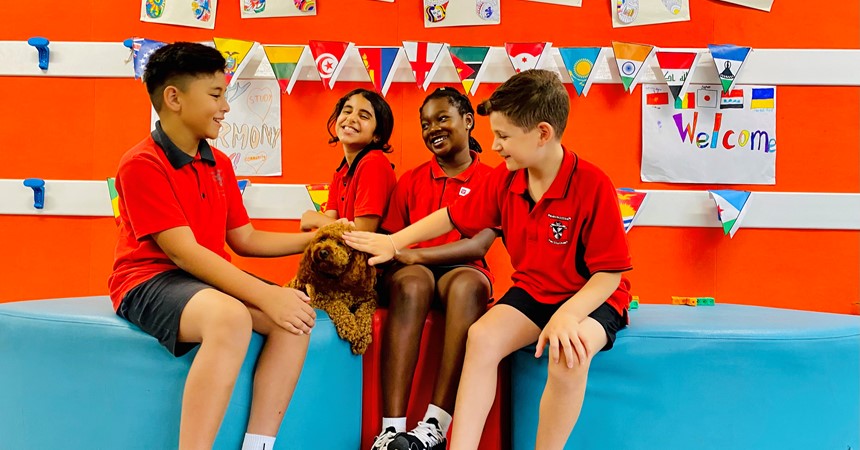President of the Australian Catholic Bishops Conference, Archbishop Timothy Costelloe SDB, said he was not surprised by the downwards trend. “Clearly the Church does not hold the privileged position in our society that it once had,” he said.
“In such a situation, my firm conviction is that…we should endlessly propose but never impose our beliefs on others.”
Interestingly, it seems families in the Hunter and Mid-Coast regions are responding to this invitation, with the overall number of students enrolled in Catholic schools in the area rising year on year, for more than 15 years.
Across the Diocese of Maitland-Newcastle there are 58 Catholic schools, spanning from just north of the Myall Lakes and down to Morriset, as well as far west from Merewether to Merriwa. More than 20,000 students attend these schools, yet not all of them are Catholic.
The Director of Catholic Schools in the Diocese of Maitland-Newcastle, Gerard Mowbray, welcomes this diversity.
“Our focus is not to provide education only for Catholics, but to anyone who is seeking a Catholic education,” he said.
He points out that the word catholic when used as an adjective, is defined as “including a wide variety of things; all-embracing.”
“A person’s faith is not stagnant, but having faith is an incredible gift. Our schools provide us with a wonderful opportunity to share our Catholic beliefs with anyone who is willing to embrace our love of life.”
So, what does a Catholic education look like today?
While nuns and Brothers have been replaced with lay teachers, the Church’s commitment to ensuring each child’s unique qualities are known, nurtured, and valued has stood the test of time.
In school yards across this region this translates to communities that are as rich as they are diverse. People who espouse various creeds, family structures, ethnic backgrounds and sexuality gather together and build relationships that are underpinned by their appreciation and respect for Creation.
When asked whether welcoming students of different faith backgrounds into Catholic schools dilutes their foundational purpose, Diocesan Administrator Fr Greg Barker professes a strong view.
“As Catholics, our vision is to live the joy of the Gospel, and to share it with the world.”
“Living the joy of the Gospel means to know you are loved and have a responsibility to love unconditionally, both in the good times and in the hard times. Sharing this joy with everyone, not just Catholics, is both our privilege and responsibility!”
“So far from diluting what it means to be Catholic, embracing others because of their differences -religious or otherwise, is a celebration of our faith,” Fr Barker said.
When it comes to educational programs, student achievement, teacher professionalism, facilities and innovation, Australian Catholic schools are at parity with their public and independent counterparts. However, Fr Barker and Mr Mowbray both agree that Catholic schools are unique in their identity.
“All parents want the best for their children, and I can think of no greater gift than sending your child to a school that fosters a love of lifelong learning, and that’s where Catholic schools really excel,” Fr Barker said.
Mr Mowbray agreed, noting that Catholic educators are empowered to engage the whole student through both their head and their heart.
“We not only educate the child whom sits in front of us today, but shape our lessons in a way that prepares that young person for life beyond the school gates,” Mr Mowbray said.
“Our approach is defined by sharing a values framework with our students that will guide them as they journey through life and take on various roles in their families, workplaces and in community.”
Adam Frost is an education officer for the Diocese and specialises in sharing faith formation with its schools. He said that attending Mass is just one aspect of what it means to be Catholic.
“Catholic education empowers students to identify ways they can translate what the Gospel says, into meaningful action,” Mr Frost said.
“We help our students to see the value in themselves and to imagine the contributions they can make to the common good.
“Our students are given the opportunity to be curious and critical thinkers, understand gratitude, find their passions and use their skills to help others,” he said.
As a result, Catholic schools across the Diocese have become platforms for student activism where a commitment to promoting social justice and protecting creation isn’t something that’s just talked about, it is acted upon each day.
“No matter which school you visit, our students are involved in, and are leading, so many wonderful initiatives. Whether it’s fundraising for charities or visiting the aged, lobbying government regarding humanitarian causes or giving up their lunchtimes to plant native trees, they are taking action and making real and positive changes in our world,” Mr Frost said.
They say the Holy Spirit works in mysterious ways and so despite what the Census data suggests, you only have to look at our future leaders that attend Catholic schools today to know that the joy of the Gospel will continue to be lived out both tomorrow and beyond.




























































































